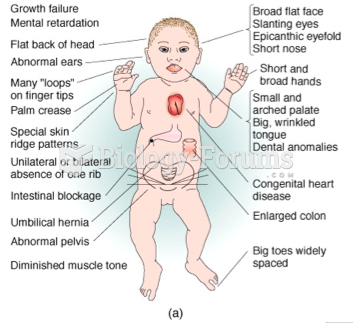Answer to Question 1
B
Feedback
A Incorrect. Noticing that the child's lab reports indicate a worsening anemia and a falling hematocrit and platelet count, the nurse caring for a child with hemolytic uremic syndrome, will not most need to plan interventions to deal with edema and electrolyte imbalance.
B Correct. Once the hemolytic process starts, the child becomes progressively more irritable, lethargic, and anorectic, as the diarrhea and vomiting continue from a few days to 2 weeks. Soon, the child experiences anemia, and, as it worsens pallor increases, the hematocrit falls, and urine output diminishes. As the platelet count falls, there is an increased chance of bleeding, bruising, and purpura. As the urinary system becomes more restricted with clot formation, the blood pressure rises leading to hypertension.
C Incorrect. Noticing that the child's lab reports indicate a worsening anemia and a falling hematocrit and platelet count, the nurse caring for a child with hemolytic uremic syndrome, will not most need to plan interventions to deal with altered levels of consciousness and seizures.
D Incorrect. Noticing that the child's lab reports indicate a worsening anemia and a falling hematocrit and platelet count, the nurse caring for a child with hemolytic uremic syndrome, will not most need to plan interventions to deal with congestive heart failure.
Answer to Question 2
A
Feedback
A Correct. Keeping a list of students enrolled in your school with medical or religious objections to immunizations or those with special health concerns that lessen their immunity makes exclusion of students easier in the event of an outbreak of a serious communicable disease.
B Incorrect. The nurse does not keep this list to reassure the family that the nurse will respect the family's wishes at all times.
C Incorrect. The nurse does not keep this list to meet state and federal requirements.
D Incorrect. The nurse does not keep this list to provide statistics for the state health department.







